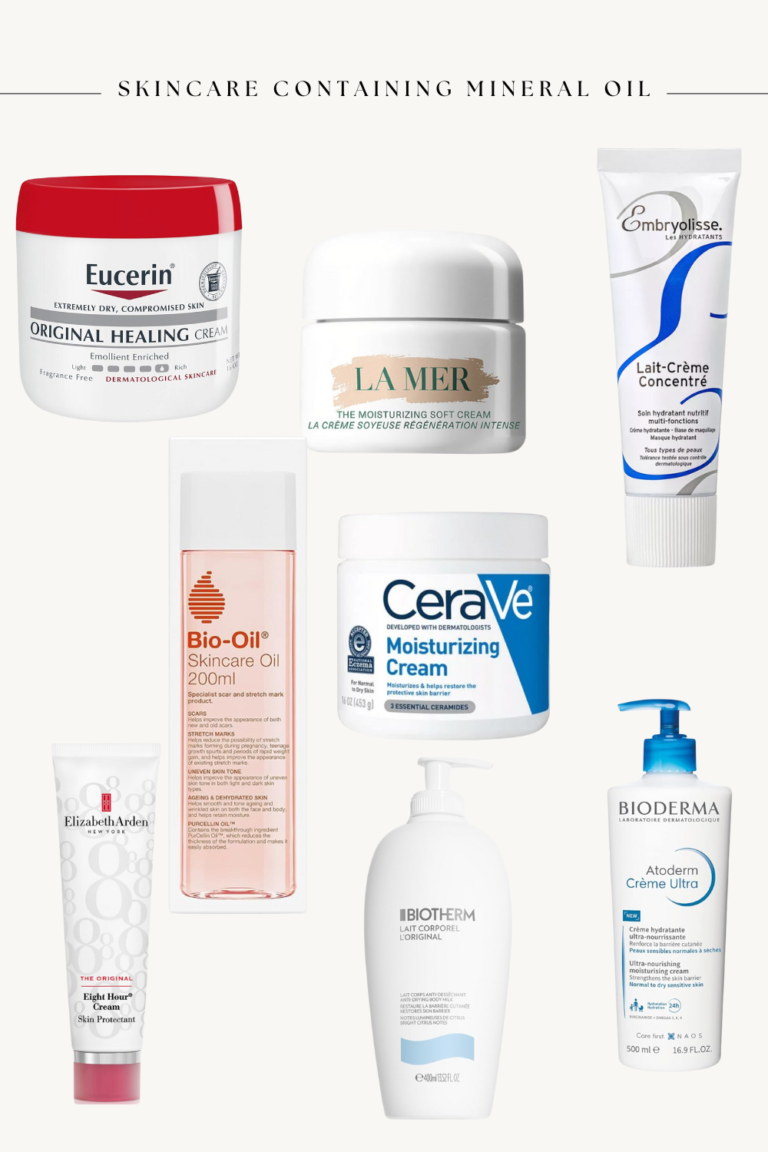It is time to dive into this ingredient and share why I avoid mineral oil in skincare and explore better, more nourishing alternatives. Understanding the pros and cons of ingredients can help you make better choices for your skin, so let’s get into it!
What is Mineral Oil?
Mineral oil is a petroleum byproduct used in various skincare products for its moisturizing properties. It forms a barrier on the skin, which helps lock in moisture, but it’s not without its downsides.
Why I Avoid Mineral Oil
- Potential Carcinogens: Mineral oil is derived from petroleum and can contain trace amounts of carcinogens. While the risk is considered low, it’s something to be aware of.
- Petroleum Byproduct: As a byproduct of the oil industry, mineral oil isn’t the most eco-friendly option. The process of refining it is complex and not particularly sustainable.
- Lack of Nutritional Value: While it creates a moisture barrier, mineral oil doesn’t offer any nutritional benefits to the skin. It can potentially clog pores and lacks the nourishing properties of natural alternatives.
Where You’ll Find Mineral Oil
Mineral oil is prevalent in many skincare products. Here are some common examples:
- Lip Balms: Mineral oil is often used in lip balms for its moisturizing properties. It creates a barrier on the lips but doesn’t provide the nourishing benefits of natural oils.
- Pharmacy Lotion Brands: Mineral oil is a key ingredient in popular pharmacy brands like CeraVe, Eucerin, and Bio Oil. These brands use mineral oil for its cost-effectiveness and ability to form a moisture-retaining barrier.
- Creams and Ointments: You’ll find mineral oil in both inexpensive and high-end creams and ointments. For instance, it’s a primary ingredient in the $400 La Mer face cream, which uses mineral oil to provide a smooth, hydrating layer.
- Cheap and Expensive Skincare: From drugstore brands to luxury skincare lines, mineral oil is widely used. Its affordability and stability make it a go-to for many formulations.
What Mineral Oil Can Be Called on an Ingredient List
Mineral oil can appear under several names on ingredient lists:
- Mineral Oil
- Paraffinum Liquidum
- Petrolatum
- Cera Microcristallina
- Microcrystalline Wax
- Ozokerite
- Ceresine
- Isoparaffin
- Paraffin
- Synthetic Wax
Why So Many Brands Use Mineral Oil
- Cost-Effectiveness: Mineral oil is relatively inexpensive to produce, making it a popular choice for many brands looking to keep costs down.
- Ease of Formulation: Its colorless, almost tasteless nature and smooth, oily texture make it easy to incorporate into various products. This versatility is why it’s used so frequently.
- Tolerance: Many people tolerate mineral oil well, making it a reliable option for a wide range of skin types.
- Water Loss Reduction: Mineral oil creates a protective film on the skin, helping to reduce water loss and maintain hydration.
- Longevity: It doesn’t oxidize easily, so it has a long shelf life and can be stored for extended periods without degrading.
Nourishing Natural Alternatives
If you’re looking to avoid mineral oil, there are natural alternatives that offer more benefits:
- Shea Butter:
- Benefits: Rich in vitamins A, E, and F, shea butter deeply moisturizes and helps repair the skin. It’s perfect for soothing dry or irritated skin.
- Cocoa Butter:
- Benefits: Cocoa butter is packed with antioxidants and improves skin elasticity. It’s great for reducing the appearance of scars and stretch marks.
- Jojoba Oil:
- Benefits: Jojoba oil closely resembles the skin’s natural oils, making it lightweight and non-comedogenic. It’s suitable for various skin types.
- Almond Oil:
- Benefits: Almond oil is rich in vitamins A, E, and fatty acids. It hydrates and softens the skin while providing essential nutrients.
- Vitamin E Oil:
- Benefits: Known for its antioxidant properties, vitamin E helps repair and protect the skin, making it ideal for treating scars and improving skin texture.
Making the Switch
Switching to natural skincare options can enhance your routine and avoid potential risks associated with mineral oil. By choosing products with nourishing ingredients like shea butter, cocoa butter, and jojoba oil, you can offer your skin the care it deserves while supporting a healthier, more sustainable approach to beauty.
I hope this information helps you make more informed choices about your skincare products. If you have any questions or want to share your favorite natural skincare products, feel free to comment below!

